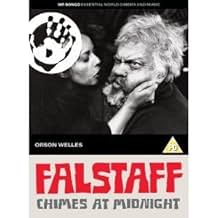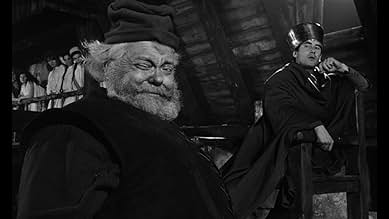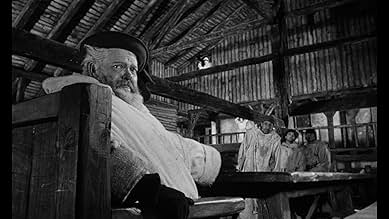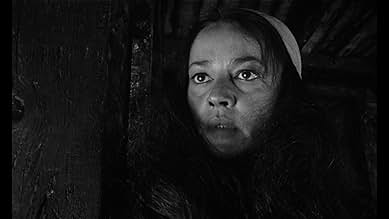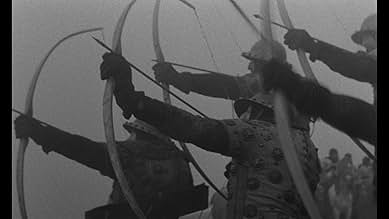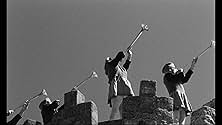NOTE IMDb
7,6/10
11 k
MA NOTE
La carrière du Sir John Falstaff de Shakespeare, tonitruant compagnon du jeune Prince Hal, aux alentours de 1400-1413.La carrière du Sir John Falstaff de Shakespeare, tonitruant compagnon du jeune Prince Hal, aux alentours de 1400-1413.La carrière du Sir John Falstaff de Shakespeare, tonitruant compagnon du jeune Prince Hal, aux alentours de 1400-1413.
- Réalisation
- Scénario
- Casting principal
- Nomination aux 1 BAFTA Award
- 3 victoires et 2 nominations au total
Michael Aldridge
- Pistol
- (as Michael Aldrich)
Andrés Mejuto
- Woman's Tailor
- (as Andres Mejuto)
José Nieto
- Northumberland
- (as Jose Nieto)
Avis à la une
What can be said about Chimes at Midnight that hasn't already been said? Orson Welles' ode to Fallstaff, a part that Shakespeare obviously created with Welles' himself in mind, seems to be the perfect culmination of his enormous (no pun intended) career. The meager budget of the film is only reflected in the bad dubbing & sound quality, which is still glaring despite restoration efforts. Welles makes up for this in film noir lit faces, intense battle scenes, and of course, his impeccable acting & connection with the character. With the minute movement of his eye, he can garner laughter or sympathy. While we may be used to chuckling at Falstaff's bumbling, brazen arrogance, Welles also brings us, in the end, to profoundly feel the anguish that lies at the depths of Falstaff's soul. His performance seems to be a psychological study on fatherly influences, quite probably pulling from his experiences with his own Fallstaffian father, among others. Having recently watched My Own Private Idaho, it is hard not to make comparisons & observe the obvious inspiration Gus Van Sant drew from Chimes for his quintessential film. It was also interesting to watch the dramatic battle scenes, which on a shoestring budget are very cleverly shot & edited to feel big budget. This film has probably inspired many larger budget Shakespearean, war & movies in other genres, and yet stands in a league of its own.
i just watched it, and it took my breath away. If possible, this might be better than Citizen Kane. Incredible. And the battle scenes are truly amazing. I only hope they'll bring out a new DVD release of it for Australia and America, because this movie deserves as much exposure as Kane. I was surprised and delighted by Welles's performance. He really shines in an atmosphere which permits theatricality (Shakespeare), and i felt this movie combines the best of his two loves: the theatre (the source material), and the cinema (told with Welles' stunning eye for a cinematic visual). Superbly produced for such a low budget (Macbeth was just too rushed in those three weeks). Its visually delicious, and has a brilliant sense of fun (like both Kane and The Trial), and yet it has more heart than the other two.
This movie has rejuvenated my love of and faith in Welles (i was really wavering after The Stranger, Macbeth and even Lady from Shanghai - all too damaged by money/studio interference for me).
Let's all take a bow to Mr Orson Welles, who after all those years of struggle, finally produced a thing of beauty and fun worthy of his talents, and reinstated his reputation as one of the greats.
This movie has rejuvenated my love of and faith in Welles (i was really wavering after The Stranger, Macbeth and even Lady from Shanghai - all too damaged by money/studio interference for me).
Let's all take a bow to Mr Orson Welles, who after all those years of struggle, finally produced a thing of beauty and fun worthy of his talents, and reinstated his reputation as one of the greats.
10ednlaura
This is one of the great Shakespearean adaptations and a true 'lost classic'. It's also the last masterpiece that Orson Welles directed in his lifetime, and with 'Citizen Kane,' 'Magnificent Ambersons' and 'Touch of Evil' comprises a quartet of major cinematic works that he accomplished.
The film is an inventive re-editing and condensation of Shakespeare's plays, spanning from the end of Richard II to the beginning of Henry V. The film focuses on the character of Jack Falstaff, played by Welles himself in a virtuoso performance. Falstaff's relationship with young Prince Hal (later Henry V) is explored, and uncannily parallels Welles' own experience with the young talents of Hollywood.
Chimes at Midnight can be a jarring experience due to inconsistent film quality, low budget sets and Welles' flair for shock cuts, but it's a truly rewarding experience once you adapt to the style and limitations.
There are several great performances, by John Gielgud as Henry IV, Keith Baxter as Hal and Norman Rodway as Hotspur, who seems like a predecessor to Kenneth Branagh.
Chimes at Midnight has a little of everything: low comedy, highly artistic camera angles, exciting battle scenes (the battle of Shrewesbury scene influenced Braveheart) and a deeply moving story that Welles has 'discovered' between the lines of Shakespeare's histories.
The film is an inventive re-editing and condensation of Shakespeare's plays, spanning from the end of Richard II to the beginning of Henry V. The film focuses on the character of Jack Falstaff, played by Welles himself in a virtuoso performance. Falstaff's relationship with young Prince Hal (later Henry V) is explored, and uncannily parallels Welles' own experience with the young talents of Hollywood.
Chimes at Midnight can be a jarring experience due to inconsistent film quality, low budget sets and Welles' flair for shock cuts, but it's a truly rewarding experience once you adapt to the style and limitations.
There are several great performances, by John Gielgud as Henry IV, Keith Baxter as Hal and Norman Rodway as Hotspur, who seems like a predecessor to Kenneth Branagh.
Chimes at Midnight has a little of everything: low comedy, highly artistic camera angles, exciting battle scenes (the battle of Shrewesbury scene influenced Braveheart) and a deeply moving story that Welles has 'discovered' between the lines of Shakespeare's histories.
Up front I think it's fair to admit that I have not read the plays Shakespeare wrote that provide the basis of this film and it's screenplay.
I've read Romeo and Juliet, Macbeth and Julius Ceaser and I'm blessed that my public education provided me that much. But when it comes to Henry the IV, V, or VI I'm pretty much in the dark.
Chimes of Midnight did not leave me in the dark however. Orson Welles, I think, did a wonderful job of translating Shakespeaian dialogue into action that could be understood, jokes that could be understood, dramatic tension that could be understood.
Not only do i realize I am 400 years removed from Shakespeare but I am also 53 years removed from whatever audience Orson Welles intended this for in in 1965.
But I don't feel removed from the artistry that it took to make this film.
I could follow the plot, I knew where characters were emotionally, and even better, I understood the jokes. Which, for me, was a huge windfall and a source of amazement.
Orson Welles was dead before I was even born and I find him totally captivating and engaging in this film. He's lovable, he's a rapscallion, he's larger than life and he breaks your heart when he's denied by the newly crowned king.
I'm coming to this as an outsider. I loved Citizen Kane and Touch of Evil, I immensely enjoyed F is for Fake, and I've been looking to engage in more films starring or directed by Orson Welles, and I walked away from this film feeling like it filled a gap.
Here was his passion for gorgeous cinematography, here was his love of the stage, here was his brilliance at translating plays, here was his love for acting here was his passion for entertainment.
At no point did this film drag for me, and even now, in 2017 did the battle scene not only engage, but surprise me. This IS masterclass film making and this film deserved a wider audience back in 1965 and it deserves it still today.
Absolutely riveting and amazing work.
I've read Romeo and Juliet, Macbeth and Julius Ceaser and I'm blessed that my public education provided me that much. But when it comes to Henry the IV, V, or VI I'm pretty much in the dark.
Chimes of Midnight did not leave me in the dark however. Orson Welles, I think, did a wonderful job of translating Shakespeaian dialogue into action that could be understood, jokes that could be understood, dramatic tension that could be understood.
Not only do i realize I am 400 years removed from Shakespeare but I am also 53 years removed from whatever audience Orson Welles intended this for in in 1965.
But I don't feel removed from the artistry that it took to make this film.
I could follow the plot, I knew where characters were emotionally, and even better, I understood the jokes. Which, for me, was a huge windfall and a source of amazement.
Orson Welles was dead before I was even born and I find him totally captivating and engaging in this film. He's lovable, he's a rapscallion, he's larger than life and he breaks your heart when he's denied by the newly crowned king.
I'm coming to this as an outsider. I loved Citizen Kane and Touch of Evil, I immensely enjoyed F is for Fake, and I've been looking to engage in more films starring or directed by Orson Welles, and I walked away from this film feeling like it filled a gap.
Here was his passion for gorgeous cinematography, here was his love of the stage, here was his brilliance at translating plays, here was his love for acting here was his passion for entertainment.
At no point did this film drag for me, and even now, in 2017 did the battle scene not only engage, but surprise me. This IS masterclass film making and this film deserved a wider audience back in 1965 and it deserves it still today.
Absolutely riveting and amazing work.
The career of Shakespeare's Sir John Falstaff (Orson Welles) as roistering companion to young Prince Hal (Keith Baxter), circa 1400-1413.
Who can say bad things about Orson Welles? His work was often neglected in his lifetime, both by audiences and critics. Looking back now, I wonder how they could have missed the genius of "Citizen Kane". But yet, they did for many years.
This film is considered to be Welles' favorite of his own (I am unsure of the source for this claim) and has been influential. Yet, it is hard to get a decent copy (the one I have was a Portuguese import). There was no actor with such a presence as Welles, so Shakespeare is natural for him. He has successfully brought the stage to screen.
Who can say bad things about Orson Welles? His work was often neglected in his lifetime, both by audiences and critics. Looking back now, I wonder how they could have missed the genius of "Citizen Kane". But yet, they did for many years.
This film is considered to be Welles' favorite of his own (I am unsure of the source for this claim) and has been influential. Yet, it is hard to get a decent copy (the one I have was a Portuguese import). There was no actor with such a presence as Welles, so Shakespeare is natural for him. He has successfully brought the stage to screen.
Le saviez-vous
- AnecdotesDespite portraying Falstaff as a grossly obese man, Orson Welles actually had to diet to slim down for the role.
- GaffesThe corpse of Hotspur opens and closes his mouth several minutes after his death.
- ConnexionsFeatured in The 43rd Annual Academy Awards (1971)
Meilleurs choix
Connectez-vous pour évaluer et suivre la liste de favoris afin de recevoir des recommandations personnalisées
- How long is Chimes at Midnight?Alimenté par Alexa
Détails
- Date de sortie
- Pays d’origine
- Langue
- Aussi connu sous le nom de
- Chimes at Midnight
- Lieux de tournage
- Calatañazor, Soria, Castilla y León, Espagne(London streets scenes)
- Sociétés de production
- Voir plus de crédits d'entreprise sur IMDbPro
Box-office
- Budget
- 800 000 $US (estimé)
- Montant brut aux États-Unis et au Canada
- 126 724 $US
- Week-end de sortie aux États-Unis et au Canada
- 13 630 $US
- 3 janv. 2016
- Montant brut mondial
- 126 724 $US
- Durée1 heure 59 minutes
- Couleur
- Mixage
- Rapport de forme
- 1.66 : 1
Contribuer à cette page
Suggérer une modification ou ajouter du contenu manquant




